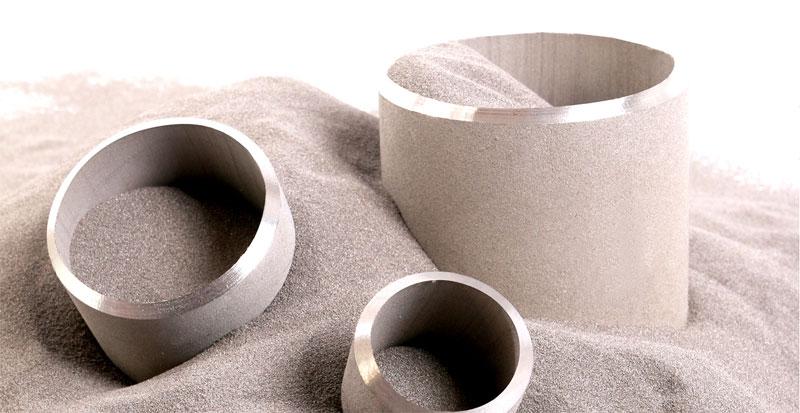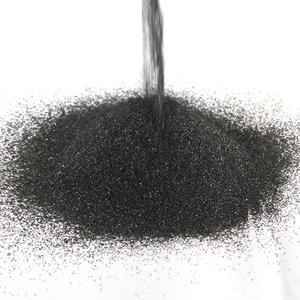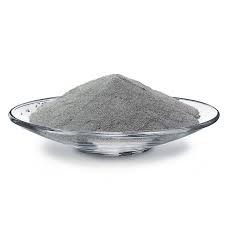Aluminum-based 3D printing powders are specialized materials designed for use in additive manufacturing processes, specifically for Powder Bed Fusion (PBF) techniques such as Selective Laser Sintering (SLS) and Direct Metal Laser Sintering (DMLS). These powders are composed primarily of aluminum, often alloyed with elements like silicon, magnesium, or titanium to improve their mechanical and processing properties. They are gaining popularity due to their lightweight nature, good thermal conductivity, and potential for high geometric complexity in a wide array of applications.
Lightweight: Aluminum is known for its low density, making aluminum-based 3D printed parts ideal for applications where weight reduction is crucial, such as in aerospace and automotive sectors.
Thermal Conductivity: These powders facilitate the production of parts with excellent heat dissipation properties, useful in heat sinks and other cooling systems.
Strength and Ductility: When alloyed correctly, aluminum powders can result in printed parts with a balance of strength and ductility, suitable for functional and structural components.
Corrosion Resistance: Aluminum naturally forms a protective oxide layer, providing inherent corrosion resistance to the printed parts.
Design Freedom: The 3D printing process allows for the creation of complex geometries and lattice structures, taking advantage of aluminum's properties to produce lightweight yet strong components.

(custom aluminum alloy CNC milling turning metal 3d printer precision casting part)
1. Model: You need to specify the model of the metal 3D printer and its purpose. The more specific you are, the better the parts will be. 2. Input Parameters: - Cutting Range (mm): specifies the maximum cutting distance the metal parts will go through. - Milling Accuracy (mm): specifies the accuracy at which the parts will be mill cut. This is important because high precision is required for the parts to fit perfectly. - Ironing Settings: specifies the settings at which the parts will be ironed after being cut. This will affect the amount of material used during the process and the quality of the final product. - Bores: specifies the number of bores that will be used in each piece of metal 3D printing part. This is important because the thickness of the parts will depend on the depth of the bores. - Material Type: specify the type of metal that will be used in the part. This will affect the performance of the parts and ensure their durability. -: specifies the length of the metal part. This is important because it affects how long the part will take to complete the design. 3. Output Parameters: - Program Code: specifies the code for manufacturing the parts. This code will define all the details such as the output parameters, tool selection, machine configuration, etc. - Font and Syntax: specifies the font and syntax for displaying the text in the printed. This can be a font file or a plugin from a software. - Chip Latency: specifies the latency of each bit in the chip that will be processed by the part. This is important because it affects the speed at which the parts will be manufactured and the quality of the finished product. 4. Design Parameters: - Accessory Requirements: specify the tools, materials, and accessories that will be required for the part. These may include hardware components, software programs, programming languages, and other supporting materials. - Dimensional Constraints: specify any constraints that must be met when using the part, such as the dimensions of the 3D printed parts. - Contact Information: specify the contact information of manufacturers who provide these parts. 5. Testing Parameters: - assembly Operation: specifies whether the part needs to be assembled before it can be turned into a 3D printable object. If this is not specified, it defaults to assembly operation. - Machine Operation: specifies whether the part should be loaded onto the machine for production or whether it can be fed directly into the machine. If this is not specified, it defaults to machine operation. 6. Installation and Maintenance: - Programming Parameters: specify the programming parameters that must be used to program the parts. These may include steps such as loading the part into the machine, applying pressure to the end product, and testing the part's functionality. - Assembly Parameters: specify the assembly parameters that must be used to assemble the parts. These may include steps such as adding the necessary hardware components, setting up the machine, and starting the feeding operation.

(custom aluminum alloy CNC milling turning metal 3d printer precision casting part)
Aerospace: Lightweight structural components, satellite parts, and aerospace fixtures benefit from aluminum's strength-to-weight ratio and design flexibility.
Automotive: Prototypes, lightweight chassis components, and intricate engine parts are being developed using aluminum-based powders to reduce vehicle weight and increase fuel efficiency.
Racing and Sports Equipment: Bicycle frames, automotive racing parts, and sports gear aluminum’s lightweight and durable properties to enhance performance.
Tooling and Fixtures: Complex, custom tooling and fixtures can be rapidly produced with aluminum powders, improving manufacturing efficiency and reducing costs.
Electronics: Heat sinks and enclosures in electronic devices take advantage of aluminum's thermal conductivity and lightweight nature.
Company Profile
Kmpass is a trusted global chemical material supplier & manufacturer with over 12-year-experience in providing super high-quality 3D printing powder and relative products.
The company has a professional technical department and Quality Supervision Department, a well-equipped laboratory, and equipped with advanced testing equipment and after-sales customer service center.
If you are looking for high-quality 3D printing materials and relative products, please feel free to contact us or click on the needed products to send an inquiry.
Payment Methods
L/C, T/T, Western Union, Paypal, Credit Card etc.
Shipment
It could be shipped by sea, by air, or by reveal ASAP as soon as repayment receipt.
Q: Is custom aluminum alloy CNC milling turning metal 3d printer precision casting part as strong as traditionally manufactured aluminum parts? A: Depending on the alloy and printing parameters, 3D printed aluminum parts can achieve similar or, in some cases, improved mechanical properties compared to traditionally cast or machined parts, especially when leveraging the design advantages of AM.
Q: What are common challenges in printing with custom aluminum alloy CNC milling turning metal 3d printer precision casting part? A: Challenges include managing high thermal conductivity leading to uneven heating and cooling, potential for hot cracking, and ensuring consistent powder bed quality to avoid porosity.
Q: Can custom aluminum alloy CNC milling turning metal 3d printer precision casting part be recycled? A: Yes, unused or unsintered powder can typically be collected, sieved, and reused in subsequent prints, contributing to sustainability efforts.
Q: How does the cost of aluminum 3D printing compare to traditional methods? A: While initial setup and material costs can be higher, aluminum 3D printing offers cost savings through reduced waste, faster prototyping, and the ability to produce complex parts in lower volumes more efficiently.

(custom aluminum alloy CNC milling turning metal 3d printer precision casting part)



